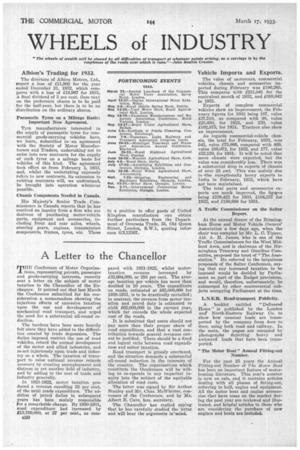A Letter to the Chancellor
Page 70

If you've noticed an error in this article please click here to report it so we can fix it.
T"Conference of Motor Organizations, representing private, passenger and goods-carrying interests, recently sent a letter on the aubjeet of motor taxation to the Chancellor of the Exchequer. It pointed out that last March the Conference submitted for his consideration a memorandum showing the injurious effects of excessive taxation upon the use and development of mechanical road transport, and urged the need for a substantial all-round reduction.
The burdens have been more heavily felt since they have added to the difficulties created by trade depression. The duties imposed restrict the use of road vehicles, retard the normal development of the motor and allied industries, and re-act injuriously upon trade and industry as a whole. The taxation of transport to raise national revenue retards recovery by creating unemployment and distress in yet another field of industry, and by adding to the cost of trade and industry generally.
In 1921-1922, motor taxation produced a revenue equalling 22 per cent. of the total roads expenditure. The addition of petrol duties in subsequent years has been mainly responsible for a remarkable change. By 1930-1931, road -expenditure had increased by £13,759,000, or 27 per cent., as corn
a20 pared with 1921-1922, whilst motortaxation revenue increased by £32,604,000, or 293 per cent. the average taxation per vehicle has more than doubled in 10 years. The expenditure on roads, estimated at 163,000,000 for 1930-1931, is to be drastically curtailed ; in contrast, the revenue from motor taxation and petrol duty is estimated to yield £62,000,000 in the current year, which far exceeds the whole expected cost of the roads.
It is submitted that users should not pay more than their proper share of road expenditure, and that a vast contribution towards general revenues cannot be justified. There should be a fixed and logical ratio between road expenditure and rebtor taxation.
Road transport is grossly overtaxed, Slid the situation demands a substantial all-round reduction in the interests of the country. The organizations which constitute the Gonference will be willing to co-operate in any impartial inquiry into the subject of the equitable allocation of road costs.
The letter was signed by Sir Arthur Stanley and Mr. Chas. McWhirter, conveners of the Conference, and by Mr. Albert E, Cave, hon. secretary.
The Chancellor has replied saying that he has carefully studied the •letter and will bear the'argumenta in'mind,




































































































































































